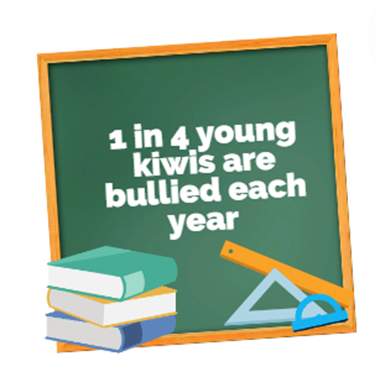What is online bullying?
While all young people can experience online bullying, often vulnerable communities experience it more. According to Netsafe(external link), online bullying can take many forms, including:
- name calling,
- repeated unwanted messages,
- spreading rumours or lies,
- fake accounts used to harass people,
- excluding people from social activities, and
- embarrassing pictures, videos, websites, or fake profiles.
Websites
Bullying-Free NZ is a central hub for New Zealand schools and provides guidance, resources and tools for schools to review, plan, and implement bullying prevention approaches.
Life Education Trust have helpful resources designed to offer teachers additional support material to use with students before and after their Life Education visits.
- Life Education Trust resources(external link)

In-class activities
Game Chat is a classroom activity looking at how we treat others when playing online games. Students are encouraged to think about their own family values and relate this to the online world.
Google's Be Internet Awesome is an online safety curriculum that helps children learn about digital safety and practice the skills they need to be a good digital citizen in an interactive and fun way. The 'It's Cool to Be Kind(external link) module helps teachers highlight the importance of online kindness and discourage online bullying.
Educational programmes
Netsafe's Kete Portal is a resource hub with a range of policy guides, school tools, classroom resources and other materials to support teachers, including lots of resources for teachers to understand cyberbullying and how to prevent it. The Keep Your Side of the Street Clean module gets tamariki thinking critically about their role in online communications to identify, prevent and respond to online bullying.
- Netsafe's Kete Portal(external link)

NZ Police Kia Kaha bullying programme is a school-based programme that aims to help schools create environments where all members of the community feel safe, respected and valued, and where bullying cannot flourish.
- New Zealand Police - Kia Kaha bullying programme(external link)
Webinars and workshops
Empowerment Trust offer resources, in-person interactive workshops and webinars with a specific focus on preventing online bullying.
- Empowerment Trust(external link) – online bullying resources
Books
Feel Brave books are stories that help young children tackle big feelings including bullying and dealing with change. The Wolf is not Invited helps children who are feeling a 'left out'. The Wolf's Colourful Coat teaches children the importance of talking to a trusted adult. All books are available for schools through Lioncrest Education.
Videos
If you are going to show videos in the classroom from YouTube, consider using YouTube kids. This restricts content depending on the age of users and ensures young people won't be exposed to inappropriate content.
Hector's World is an engaging animated series supported by lesson plans and worksheets, offering 4–8-year-old children practical guidance on identifying bullying behaviour, why it is hurtful and strategies to deal with bullying online.
Animated videos of the Feel Brave books are also available. Two books in the series are focused on bullying, The Wolf Is Not Invited helps children who are feeling left out and learn how to make their own fun and The Wolf's Colourful Coat teaches children the importance of talking to a trusted adult.
- Feel Brave - The Wolf Is Not Invited storytime(external link)
- Feel Brave - The Wolf's Colourful Coat storytime(external link)
The Mighty Heroes is an animated series from eSafety Australia that teaches children aged 4-8-years old about trusting their feelings and asking for help when something doesn't feel right. It has accompanying educator notes to support classroom discussions of the key messages.
- eSafety Commissioner - Mighty Heroes(external link)
Online Games
Interland is an educational online game by Google that helps children put online safety skills into practice. The game has four levels including 'Kind Kingdom' that teaches the importance of online kindness and discourages online bullying.
- Google - Interland(external link)